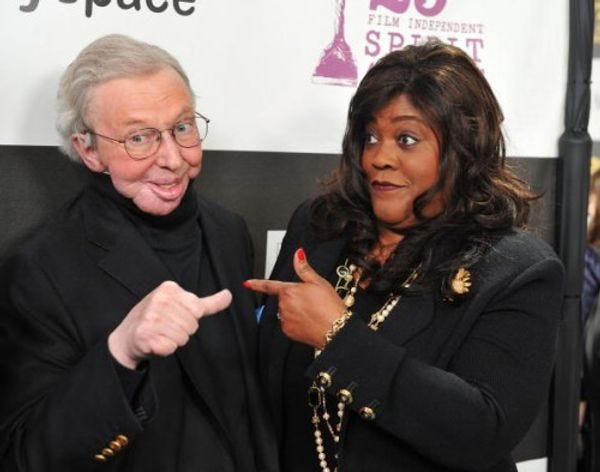Thursday Sad Time: Liberal-Hearted Lord Of Snark Roger Ebert Dead At 70
Roger Ebert’s voice was literally silenced by cancer in 2006 but the world was still able to experience his invaluable thoughts, and his kindness, and his true liberal-hearted warmth.
He was more than just another well-read wiseass who knew how to craft a universally accessible message. For all the power that he had as America’s most notable critic, Roger Ebert was a man who deployed his well-regarded opinions through the lens of a strong and brave moral constitution. It was Ebert who more than anyone else realized the importance of Michael Moore’s narrative documentary "Roger and Me” and why a movie about the existential war on the working class needed to be seen by a country still huffing the fumes of Reaganomics. It was Ebert who understood the visual impact of his own fragile human form and used it to force Americans into understanding the moral importance of establishing healthcare as a right within our modern democracy .
Ebert’s clarion call against the rising tide of fascism within this country -- as evidenced by our fascination with simplistic, yet enticing films celebrating social order through violence -- shows that he wasn't just a gentle man, he was also clear-sighted. Reading Ebert’s 1971 review of the entirely awful “Dirty Harry” in 2013 should send shivers down the spine of anyone who has paid attention to how our society views the existential issues democracy and safety:
There is a book named 'From Caligari to Hitler' that tries to penetrate the German national subconscious by analyzing German films between 1919 and the rise of the Nazis. I have my doubts about the critical approach (it gets cause and effect backwards), but if anybody is writing a book about the rise of fascism in America, they ought to have a look at " Dirty Harry .”
.........
It is possible to see the movie as just another extension of Eastwood's basic screen character: He is always the quiet one with the painfully bottled-up capacity for violence, the savage forced to follow the rules of society. This time, by breaking loose, he did what he was always about to do in his earlier films. If that is all, then " Dirty Harry " is a very good example of the cops-and-killers genre, and Siegel proves once again that he understands the Eastwood mystique.
But wait a minute. The movie clearly and unmistakably gives us a character who understands the Bill of Rights, understands his legal responsibility as a police officer, and nevertheless takes retribution into his own hands. Sure, Scorpio is portrayed as the most vicious, perverted, warped monster we can imagine -- but that's part of the same stacked deck. The movie's moral position is fascist. No doubt about it.
I think films are more often a mirror of society than an agent of change, and that when we blame the movies for the evils around us we are getting things backward.
Ebert’s unassailable integrity, unmovable moral convictions, and fantastic sense of humor will always be an essential guide to those of us who look at the world and feel the need to make a few publicly accessible cogent remarks about it. Furthermore, his bravery in facing such a painful and prolonged march to death has undoubtedly touched us all as we ponder our own inevitable future. So tonight in his honor feel free to make something from his wonderful rice-cooker cookbook while watching Citizen Kane for the umpteenth time.
Oh and fuck Jim Hoft and his nasty-ass little brownshirt followers.
[ NYT ]



No comment except I am going to have to find time this weekend to watch that episode of "The Critic" with Siskel and Ebert.
If I recall correctly, after Siskel skewered it, they showed the clip of Pee Wee falling off his bike and saying "I meant to do that," Ebert just kind of looked at the camera and said "That looked pretty funny."
I have no idea why I remember that.